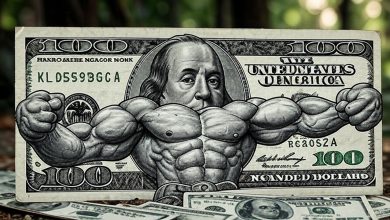Use Stock Market Downturns To Make Your Kids Millionaires

Nobody enjoys a stock market downturn, especially those who rely more on returns without active income. But as parents, we can use these sell-offs as an opportunity to help turn our kids into future millionaires.
Although I’m a perennial optimist, I believe our kids are kind of screwed. The world is getting more competitive by the day, AI is set to eliminate millions of jobs by 2040, and now it takes near-perfect SAT scores and GPAs just to have a shot at college. Long gone are the days when you could graduate and be set for life—supporting a family of four on one steady income.
But here’s the upside: as an optimist, I believe there’s still a way for kids to live comfortably, even if they get rejected from every school and company they apply to. And that’s by making them wealthy. With at least $1 million in investments, they won’t need to chase elite schools or high-paying jobs in tech, finance, law, or medicine. They can live with purpose, free from the pressure to “make it big.”
Unfortunately, I don’t see signs of genius in my kids, at least not yet. That means they probably won’t be getting perfect scores or the big scholarships needed to make college affordable. So, like any loving parent, I’m stepping in to help.
I love having specific financial goals because they keep me focused. One of my newest? Helping my two kids build $1 million portfolios by steadily investing in stocks. It might sound crazy, but I love having an insurance policy in case of a difficult future.
The Stock Market Downturn Will Help Create Future Millionaires
With my new book, Millionaire Milestones: Simple Steps To Seven Figures, coming out, I’ve been obsessed with helping readers build lasting wealth. I recently re-read the manuscript and felt a surge of excitement—not just for my own journey, but for my kids’. I’m confident you’ll walk away from the book fired up to take action too.
There are countless ways to grow wealth, as outlined in the book. But for kids, two of the easiest vehicles are Roth IRAs and custodial investment accounts (UTMAs). In this post, I want to focus on stock investing for our children, especially during market downturns.
On April 7, the market briefly dipped back into bear territory—down over 20%—after Liberation Day failed to excite investors and Trump’s proposed tariffs shocked expectations. While others were panicking, I saw this chaos as a golden opportunity to invest for my kids, who still have 10–13 years before reaching adulthood.
But first, here’s why investing for your children might help YOU just as much as it helps them.
Why Investing For Your Kids Helps You Too
If you’re a parent reading Financial Samurai, I know you want the best for your children. That’s why you’ve likely opened 529 plans, Roth IRAs, or custodial accounts for them already. The more you help them, the less you will worry about their future.
At the end of 2024, I made a mistake. Despite being cautious on the markets—as I wrote in my 2025 S&P 500 forecast—I contributed several thousand to my son’s UTMA account, just like I had for the past seven years. The market was stable for a bit… then tanked. Classic. I felt like a fool.
But when the S&P 500 continued its slide, I saw a chance to buy the dip in his account. His balance was about $70,000 after the latest year-end contribution, small enough that any loss could be completely offset by further investing. In essence, I had the power to erase the dip, and my bad timing entirely. Psychological, that felt wonderful!
My portfolio? Not so lucky. After 29 years of building it up, it was simply too large to backstop. I no longer had a six-figure job to throw fresh cash at the downturn, and let’s be honest, writing is one of the lowest-paid professions. There wasn’t much I could do to stop the nose dive.
If I couldn’t save my own portfolio from destruction, at least I could save my kids’ portfolios.
A Huge Psychological Win As A Parent To Invest For Your Kids
Buying a dip is never easy. You don’t know when it’ll end, and those head fakes can wear you down. During the Trump tariff war, the market dropped for almost 40 straight days. It could still return to the lows given there’s not much progress with China and stagflation is now a likely outcome.
I worried about how many years of gains I might lose from being overexposed to stocks. Maybe my ~28% net worth allocation to stocks was too high after all. As every stock investor knows, the key to building great wealth is time in the market, not timing the market.
But with my son’s UTMA, each drop felt like an opportunity. I had no fear investing for him (and my daughter) because I knew the time horizon was long. And once I transferred the funds out of my own account and into his, the burden lifted. That money wasn’t mine anymore. It was up to the stock market gods to do their thing.
While my own portfolio was bleeding red, I’d look at his account and feel joy. Yes, it was technically the same pool of money being shifted, but his account felt like it had been blessed. It was surging, and just as importantly, I was taking action for his future.
Every dollar I invested for him after the drop made me feel like a more responsible parent. It became a way to fight back—against the markets, against my own doubts, and against the guilt I felt for mistiming the market earlier.
Create An Investment Portfolio Winner For Your Kids
The funny thing is, every person wealthier than you could, in theory, help wipe away your losses during a bear market. I sometimes dream about this when my own stock portfolio is getting pummeled.
If your $5 million portfolio is down 20%, like one couple I saw with inappropriate stock exposure for their ages, a centi-millionaire could easily gift you $1 million to make you whole again. Unfortunately, you probably don’t know anyone willing—or able—to do that for you.
But when it comes to your children, the story changes. You love them more than anything, and you will do whatever it takes to wipe away their financial losses. And that’s exactly what you can do by buying the stock market dip for them and building a beautiful investment portfolio.
Not only will they benefit financially in the future, but you’ll also benefit psychologically by fulfilling your role as a provider.

When The Custodial Investment Account Gets Too Large
Both of my kids’ custodial investment accounts are 100% invested in stocks. It’s the right asset allocation for them, given their 10+ year time horizons and relatively small portfolios. However, once a custodial account crosses the $100,000 threshold—as theirs now have—the potential for loss starts to feel more real.
A 20% bear market would translate to a $20,000 paper loss—just above the 2025 annual gift tax exclusion of $19,000. So once your child’s UTMA crosses $100,000, it’s worth considering dialing down the risk by shifting more into bonds. If we enter a stagflationary environment, the S&P 500 could easily correct again.
I’m also under no illusion that my son’s UTMA account will always look this good. This is likely the peak before a long, bumpy ride. And that’s fine as it still provides psychological relief compared to my own portfolio, which has taken more of a beating.
But I’m not backing down from stocks. Because his account isn’t mine and is smaller, I’m comfortable staying fully invested. Every further 10%+ correction will be filled with another injection by me.

The First Step to $1 Million Is Hitting $250,000
As I wrote in Millionaire Milestones, the most important checkpoint before reaching $1 million is getting to $250,000. That’s the point where compounding truly starts to work its magic.
We know stocks finish higher 70–75% of the time each year. Historically, the S&P 500 returns around 10% annually. At a $250,000 portfolio size, a 10% return equals $25,000—more than the annual gift tax exclusion or the 401(k) employee contribution limit. Once you hit that number, the portfolio starts working harder than you.
So, I’m sticking with a 100% stock allocation in my son’s UTMA. At a 6% compound annual growth rate with $19,000 in average annual contributions, his portfolio should surpass $250,000 by age 15. At that point, I’ll reassess the risk and potentially reallocate toward more bonds.
When to Reduce Risk in a Custodial Account
There are a few ways to think about asset allocation in your child’s UTMA account. The wrong way? Just matching your own portfolio. You’re older, have different obligations, a larger net worth, and a very different risk profile.
Logically, your child’s UTMA account should carry more risk, given their age, future earning power, and smaller portfolio size. You can always follow my age-based stock-and-bond allocation guide. It’s a smart approach.
But here’s another method I like: compare the size of their UTMA account to your total stock portfolio. If your stock portfolio is at least 20X the size of their custodial account, you should feel comfortable keeping their allocation stock-heavy until they turn 18. At 10X the size, you can start considering dialing back risk or contributing more aggressively to your own retirement portfolio.
Once they’re 18, sit down with them and discuss their goals and how different portfolio compositions can affect their future. Fortunately, I’ve also compiled historical returns for various stock-bond mixes to help guide that conversation.
Won’t Hit Millionaire Status by 18—And That’s OK
Unfortunately, I won’t be able to make my son a millionaire by the time he’s 18 just through just his custodial account. At a 6% compound return with $19,000 annual contributions, his portfolio will grow to about $366,000 over 10 years.
Still, $366,000 is a strong foundation for adulthood. It’s past the $250,000 threshold I believe is the most important to get to $1 million. If he gets rejected from 95% of the colleges he applies to—as I expect—he’ll have the financial cushion to take a gap year, study abroad, start a business, or apprentice in the trades.
And if he lets the portfolio compound untouched at 6% with no additional contributions, it should grow to $1 million by age 35. Knowing that helps me sleep well at night. There’s even more upside if he decides to contribute on his own and invest aggressively as an adult.
If this strategy appeals to you, feel free to follow it! You can even cheat a little by adding the balances of your child’s 529 and Roth IRA accounts to hit millionaire status sooner. But I think there’s something elegant about focusing on one account and building it up as much as possible.
Readers, what are your thoughts on taking advantage of stock market downturns to help make your kids millionaires? Is this a foolish goal that risks creating entitled and unmotivated adults? Or is it a wise move to build their financial foundation early—an insurance policy against years of rejection, uncertainty, and stress from the college admissions process and beyond?
What are your plans for building your children’s UTMA accounts in this stock market? And how much do you think is enough—or too much?
Your Guide To Becoming A Millionaire
If you want to become a multi-millionaire and help make your kids millionaires by the time their frontal cortex fully develops, pick up a copy of Millionaire Milestones: Simple Steps To Seven Figures. I’ve distilled over 30 years of experience to help you and your children build more wealth than 93% of the population.
Once you finish the book, I promise you’ll feel motivated to take action toward achieving financial independence. I was pleasantly surprised by how pumped I got re-reading Millionaire Milestones and methodically buying the dip for both my children’s UTMA accounts. Let me help you take action to build great wealth for your family.

Hedge Against Artificial Intelligence Eliminating Jobs
If you believe AI will eliminate millions of jobs and make finding well-paying work harder for your children, consider investing in the top private AI companies. This way, if the AI revolution plays out, you’ll likely profit handsomely. And if it doesn’t, at least you’ll have given your children a greater financial cushion.
One of the easiest ways I’ve found to invest in private AI companies is through Fundrise Venture. It provides exposure to some of the top names, including OpenAI, Anthropic, Databricks, and Anduril, among others. With just a $10 minimum, it’s an accessible option for almost anyone.
Personally, I’ve invested $153,000 in Fundrise Venture so far, with a goal of increasing my investment amount to $250,000 over time. It’s a way to diversify away from the volatile stock market. Further, in 15 years, my kids won’t be able to ask why I didn’t invest in AI when it was just getting started—because I already will have.

Source: Use Stock Market Downturns To Make Your Kids Millionaires




